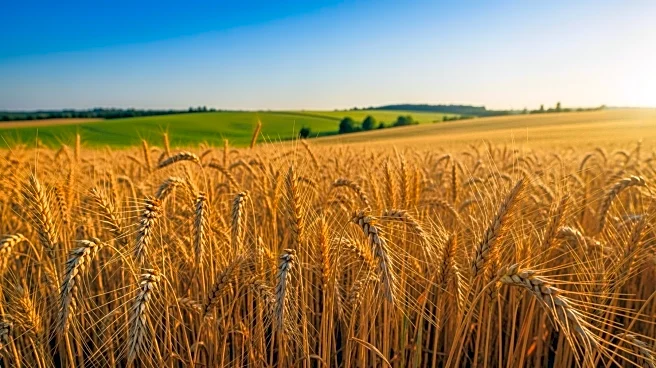What's Happening?
China is poised for a significant grain harvest in 2025, as reported by the Ministry of Agriculture and Rural Affairs. Despite earlier challenges such as droughts and floods, the country has harvested nearly 20% of its autumn grain, supported by stable summer grain output and increased early rice production. Technological advancements, including new crop varieties and advanced farming machinery, have contributed to this success. The expansion of autumn crop planting areas and improved agricultural processing have bolstered farmer incomes, with rural residents seeing a rise in per capita disposable income. The government has also introduced measures to boost agricultural consumption, enhancing market demand.
Why It's Important?
China's agricultural success has implications for global food security and economic stability. As one of the world's largest grain producers, China's harvest impacts international grain markets and prices. The technological advancements and increased efficiency in farming practices may serve as a model for other countries seeking to enhance their agricultural output. The rise in farmer incomes reflects broader economic growth, potentially influencing rural development and reducing poverty. China's focus on agricultural consumption and e-commerce promotions may stimulate global trade and economic partnerships.
What's Next?
China's continued investment in agricultural technology and infrastructure suggests ongoing improvements in grain production efficiency. The government's plans to promote agricultural product consumption may lead to increased exports and international collaborations. Monitoring the impact of climate change on future harvests will be crucial, as will the adaptation of farming practices to mitigate environmental challenges. The success of China's grain harvest may encourage other nations to adopt similar technological innovations and policy measures to enhance their agricultural sectors.
Beyond the Headlines
The emphasis on technological advancement in agriculture raises ethical considerations regarding the use of genetically modified crops and the environmental impact of intensive farming practices. China's approach to boosting rural incomes and consumption may influence global discussions on sustainable development and poverty alleviation. The integration of e-commerce in agricultural markets highlights the evolving nature of global trade and the potential for digital platforms to transform traditional industries.








